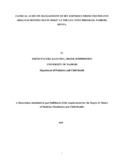| dc.description.abstract | Back ground: The majority of infants born to HIV-infected women, are HIV-exposed uninfected (HEU). Effective clinical management of these children will prevent seroconversion, severe illness and malnutrition. To ensure quality care the Ministry of health has guidelines for standard evidence based care that all providers follow.
Objectives: A clinical audit to determine proportion of HEU children aged less than 24months enrolled in Lea Toto program that accessed and adhered to Kenyan National guidelines in the following components: early infant HIV diagnosis (EID), anti-retroviral prophylaxis, immunization, retention in care, and management of nutrition and infectious co-morbidity.
Methods:
Design, Setting and Participants
This was a clinical audit conducted at Lea Toto program a faith based NGO which has for the past 20 years provided health services to families of children affected by HIV and currently serves up to 3,100 HIV-positive children and up to 15,000 family members annually. The study participants were HEU children 0 to 24 months old on follow up in 2016-2017.
Children were classified as HEU on the basis of their first HIV PCR test being negative. After informed consent a standardized clinical audit tool was used to abstract data from the electronic medical records of the HEU infants. The tool was used to collect information on timing and results of the early infant HIV diagnosis, ART prophylaxis, nutrition status, morbidity, immunization and adherence to follow up.
Results: A total of 322 electronic medical records of HEU infants at Lea Toto program were evaluated. Age on enrolment into the program was from 3 days of age to 20 months of age. The mean age of first HIV PCR test was 2.01 months. A total of 287(89.13 %) of the first HIV PCR were done at Lea Toto. Overall 299 (92.8%) of the 322 participants received ART prophylaxis, 144 (44.7 %) the recommended combined Zidovudine (AZT) + Nevirapine (NVP) prophylaxis, and 155 (48%) only NVP. Only 217 (67.39%) participants started ART prophylaxis on first day of life and up to 219 (68.01%) HEU were on the ART prophylaxis for 3 months, while 25(7.8%) receive a shorter course of prophylaxis because of loss to follow-up or no longer at risk, and 78 (24.2%) received more than 3 months prophylaxis due to heightened risk of infection from
maternal viral non-suppression.. The 23 (7%) who did not received ART prophylaxis were enrolled into the program after they had been weaned off breastfeeding and reports of ART prophylaxis could not be verified. Overall 265 (82.3%) received cotrimoxazole prophylaxis. There were 214 (66.45%) participants who reported exclusive breastfeeding for 6 months, 58
(18%) for 5 months and only 10 (3%) for less than a month. Overall 72 (22.4%) had some
malnutrition including 43 (13%) moderate malnutrition, 13 (4%) stunted, 9 (3%) wasted, while 7 (2%) both wasted and stunted. Only 26 (8.1%) of the 322 participants were admitted to hospital during the period of audit. Only 4 (1.2%) children seroconverted. Factors associated with seroconversion were late enrolment, inappropriate ART prophylaxis and incomplete HIV testing.
Conclusion and recommendation:
Children enrolled in the Lea Toto program are accessing the essential HIV care package. Late enrollment into the program was associated with increased likelihood of malnutrition and HIV infection. There is need for continuing medical education (CME) to address the observed low PCR testing rate at 9 months and inappropriate use of CTX before the age of 6 weeks of life. | en_US |
| dc.description.department | a
Department of Psychiatry, University of Nairobi, ; bDepartment of Mental Health, School of Medicine,
Moi University, Eldoret, Kenya | |



